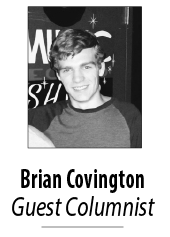
But you might not have read the article “Major shaming: What’s the use?” After all, it wasn’t in our News-Letter. It was a piece in The Daily Pennsylvanian by a sophomore at the University of Pennsylvania named Alex Silberzweig.
In her article, Silberzweig encourages her readers to ignore snobbish attitudes toward the humanities and social sciences, by mapping the history of major shaming. I’ll pick up where she left off. Unlike Neber and Malcom, I’m not interested in encouraging Hopkins students to stop major shaming. Instead, like Silberzweig, I want to map the history of major shaming, and I want to trace the root of major shaming back to the Space Race.
But before I describe the history of major shaming, I’d like to present Silberzweig’s account.
“’Major shaming’ — being made fun of because of your major — is exceedingly common,” she writes. “Just 20 years ago, having a college degree, regardless of your major, was enough to get your foot in the door. Nowadays, college degrees are about a dime a dozen. And so, many people use college majors as distinguishing factors between one person and the next.”
According to Silberzweig, major shaming started because of an upsurge in the number of college graduates.
However, I’ll trace the origins of major shaming even further back, to the 1950s.
During the Cold War, the Soviet Union’s success in launching Sputnik drove American schools to prioritize engineering and the natural sciences. A contributor to The New York Times named Cornelia Dean said it better than I can. “For many, Sputnik was proof that American education, particularly in science, had fallen behind,” Dean wrote in a 2007 article for The New York Times.
“Scientists and engineers warned Congress that the Cold War was being fought with slide rules, not rifles. In response Congress passed the National Defense Education Act in 1958, providing, among other things, college scholarships and other help for aspiring scientists, engineers and mathematicians,” Dean wrote.
Thus, the tendency of American schools to privilege engineering and the natural sciences over the humanities and the social sciences was born.
When Dean writes that Americans granted prestige to STEM fields, she implies that they declined to give the humanities and social sciences this same prestige. Now, the Soviet Union is gone, but those attitudes are not.
You might have noticed that I’m writing about major shaming like it’s an American problem. That’s because it is. Just look at Europe’s reaction to the U.S. government’s cuts to the humanities and social sciences. In 2009, former Senator Tom Coburn suggested cutting funding for political science research in the National Science Foundation (NSF), which he considered wasteful.
Congress passed a compromise in 2013 and cut NSF funding to most political science programs. From then until 2014, the NSF could fund only political science programs proven to benefit American economic interests and national security.
Congress’s decision shocked some representatives of the EU. Responding to the budget cuts, former President of the European Research Council Helga Nowotny wrote an article for The Guardian accusing the U.S. government of gutting political science curricula and failing to appreciate the humanities and social sciences.
“In the United States, the social sciences and humanities are under attack. In Europe, we are committed to integrating the natural sciences, engineering, and social sciences and humanities, aiming to foster better, more valuable research,” she wrote.
Later in the article, she praised the EU’s plans to invest in interdisciplinary research between STEM fields and the humanities.
But, what does this have to do with major shaming? Coburn’s criticism of the NSF’s political science programs as wasteful reflects a common sentiment on college campuses: “You’re actually spending $70,000 a year on a degree that makes you unemployable?”
Most of you have heard students at Hopkins ask this question. Maybe you’ve asked it. Maybe you’ve been asked — I have. Either way, Coburn’s words embody this distinctly American attitude, and Nowotny’s views more closely resemble European attitudes. Generally, European schools appreciate the humanities and social sciences more than American schools.
This split between American and European views on the social sciences started during the Cold War. Major shaming became more common in the United States than in, say, France, because the United States fought in the Space Race. The U.S. invested disproportionately in STEM fields in order to build space shuttles, but France didn’t.
Major shaming was born during the Space Race, but the Space Race ended in 1991. Why didn’t major shaming?




